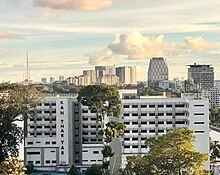
Back بوابة:الاقتصاد Arabic Portal:Ekonomija BS Portal:Economia Catalan دەروازە:ئابووری CKB Portál:Ekonomie Czech Portal:Wirtschaft German Πύλη:Οικονομία Greek Portal:Economía Spanish Portaal:Majandus Estonian درگاه:اقتصاد Persian
The Business and Economics Portal Business is the practice of making one's living or making money by producing or buying and selling products (such as goods and services). It is also "any activity or enterprise entered into for profit." A business entity is not necessarily separate from the owner and the creditors can hold the owner liable for debts the business has acquired. The taxation system for businesses is different from that of the corporates. A business structure does not allow for corporate tax rates. The proprietor is personally taxed on all income from the business. A distinction is made in law and public offices between the term business and a company such as a corporation or cooperative. Colloquially, the terms are used interchangeably. (Full article...) Economics (/ˌɛkəˈnɒmɪks, ˌiːkə-/) is a social science that studies the production, distribution, and consumption of goods and services. Economics focuses on the behaviour and interactions of economic agents and how economies work. Microeconomics analyses what's viewed as basic elements in the economy, including individual agents and markets, their interactions, and the outcomes of interactions. Individual agents may include, for example, households, firms, buyers, and sellers. Macroeconomics analyses the economy as a system where production, distribution, consumption, savings, and investment expenditure interact, and factors affecting it: factors of production, such as labour, capital, land, and enterprise, inflation, economic growth, and public policies that have impact on these elements. (Full article...) Selected articleIn economics, hyperinflation is inflation that is "out of control," a condition in which prices increase rapidly as a currency loses its value. No precise definition of hyperinflation is universally accepted. One simple definition requires a monthly inflation rate of 20 or 30% or more. In informal usage the term is often applied to much lower rates. The definition used by most economists is "an inflationary cycle without any tendency toward equilibrium." A vicious circle is created in which more and more inflation is created with each iteration of the cycle. Although there is a great deal of debate about the root causes of hyperinflation, it becomes visible when there is an unchecked increase in the money supply or drastic debasement of coinage, and is often associated with wars (or their aftermath), economic depressions, and political or social upheavals. The main cause of hyperinflation is a massive imbalance between the supply and demand of a certain currency or type of money, usually due to a complete loss of confidence in the currency similar to a bank run. First, the enactment of legal tender laws prevent discounting the value of paper money vis-a vis gold, silver or a hard currency, by forcing acceptance of a paper money which lacks intrinsic value. If the entity responsible for printing a currency then promotes excessive money printing, with other factors contributing a reinforcing effect, hyperinflation usually occurs. Often the body responsible for printing the currency cannot physically print paper currency faster than the rate at which it is devaluing, thus neutralising their attempts to stimulate the economy. Selected image
Selected economyThe economy of Myanmar is the seventh largest in Southeast Asia. After the return of civilian rule in 2011, the new government launched large-scale reforms, focused initially on the political system to restore peace and achieve national unity and moving quickly to an economic and social reform program. Current economic statistics were a huge decline from the economic statistics of Myanmar in the fiscal year of 2020, in which Myanmar’s nominal GDP was $81.26 billion and its purchasing power adjusted GDP was $279.14 billion. Myanmar has faced an economic crisis since the 2021 coup d'état. (Full article...) Selected quote" Monopolistic competition is a challenge to the traditional viewpoint of economics that competition and monopoly are alternatives and that individual prices are to be explained in terms of either the one or the other. By contrast, it is held that most economic situations are composites of both competition and monopoly, and that, wherever this is the case, a false view is given by neglecting either one of the two forces and regarding the situation as made up entirely of the other. This seems to be a very simple idea. Indeed if one is not quite set in the way of thinking which involves mutual exclusiveness, it is grasped at once."
TopicsRelated WikiProjectsDid you know (auto-generated) -
On this day in business history
General imagesThe following are images from various business-related articles on Wikipedia.
More did you know
Business news Wikinews Economy and business portal
|
© MMXXIII Rich X Search. We shall prevail. All rights reserved. Rich X Search





































